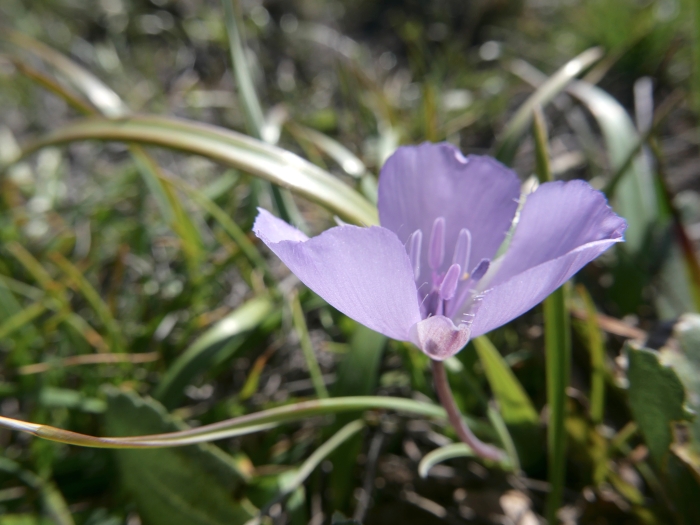Monterey Mariposa Lily
(Calochortus uniflorus)
Monterey Mariposa Lily (Calochortus uniflorus)
/
/

paulexcoff
CC BY-SA 4.0
Image By:
paulexcoff
Recorded By:
Copyright:
CC BY-SA 4.0
Copyright Notice:
Photo by: paulexcoff | License Type: CC BY-SA 4.0 | License URL: http://creativecommons.org/licenses/by-sa/4.0/ | Rights Holder: paulexcoff | Publisher: iNaturalist | Date Created: 2022-02-25T13:35:52-08:00 |















Estimated Native Range
Summary
Calochortus uniflorus, commonly known as Monterey mariposa lily or large-flowered star-tulip, is a perennial herb that is native to the grasslands, open oak woodlands, and chaparral of western Oregon and California. It typically grows in moist meadows and coastal hills, as well as in the lower-elevation mountains. This species reaches a modest height, with a short, unbranching stem less than 2 inches tall, and features a basal leaf that can grow up to 16 inches long. The inflorescence consists of a loose cluster of 1 to 5 erect, bell-shaped flowers, each with white to pink petals that are adorned with purple spotting near the bases, blooming in late spring to early summer. The flowers are particularly showy, making them a highlight in native plant gardens. The fruit is a capsule that can measure up to 2.2 inches long.
The Monterey mariposa lily is valued for its ornamental flowers and is often used in wildflower gardens, rock gardens, and native plant landscapes. It is relatively low-maintenance, requiring minimal care once established in a suitable location. It thrives in full sun to part shade and prefers well-drained soils. While it is drought-tolerant, it benefits from occasional watering during prolonged dry periods. Gardeners should be aware that it can be susceptible to bulb rot if overwatered or planted in poorly drained soils. This plant is not known for aggressive roots or significant disease problems, but slugs and snails may sometimes feed on the foliage.CC BY-SA 4.0
The Monterey mariposa lily is valued for its ornamental flowers and is often used in wildflower gardens, rock gardens, and native plant landscapes. It is relatively low-maintenance, requiring minimal care once established in a suitable location. It thrives in full sun to part shade and prefers well-drained soils. While it is drought-tolerant, it benefits from occasional watering during prolonged dry periods. Gardeners should be aware that it can be susceptible to bulb rot if overwatered or planted in poorly drained soils. This plant is not known for aggressive roots or significant disease problems, but slugs and snails may sometimes feed on the foliage.CC BY-SA 4.0
Plant Description
- Plant Type: Herb
- Height: 1-1.75 feet
- Width: 0.3-0.5 feet
- Growth Rate: Moderate
- Flower Color: Pink, Purple
- Flowering Season: Spring, Summer
- Leaf Retention: Deciduous
Growth Requirements
- Sun: Full Sun
- Water: Low, Medium
- Drainage: Medium, Slow
Common Uses
Bee Garden, Border Plant, Butterfly Garden, Low Maintenance
Natural Habitat
Native to the grasslands, open oak woodlands, and chaparral of western Oregon and California
Other Names
Common Names: Largeflower Fairyfan, Large-Flowered Star-Tulip
Scientific Names: , Calochortus uniflorus, Calochortus lilacinus, Cyclobothra uniflora,
GBIF Accepted Name: